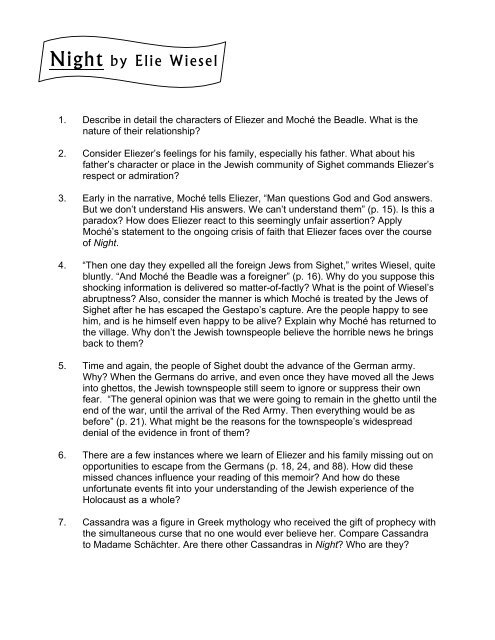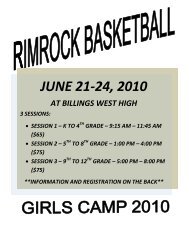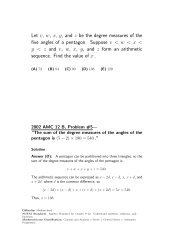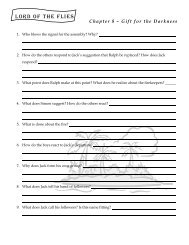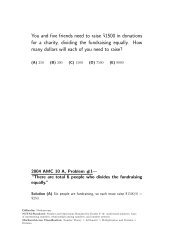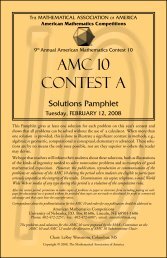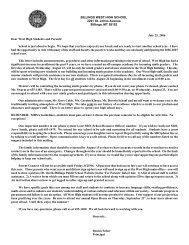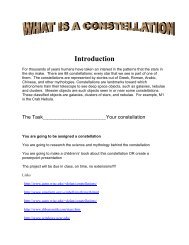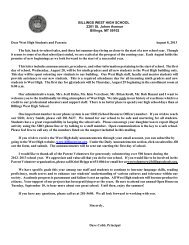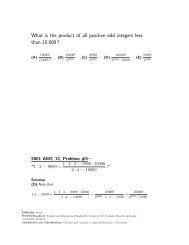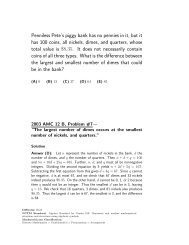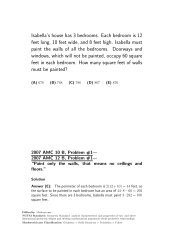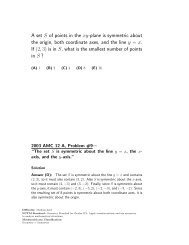Night by Elie Wiesel
Night by Elie Wiesel
Night by Elie Wiesel
Create successful ePaper yourself
Turn your PDF publications into a flip-book with our unique Google optimized e-Paper software.
<strong>Night</strong> <strong>by</strong> <strong>Elie</strong> <strong>Wiesel</strong><br />
1. Describe in detail the characters of <strong>Elie</strong>zer and Moché the Beadle. What is the<br />
nature of their relationship?<br />
2. Consider <strong>Elie</strong>zer’s feelings for his family, especially his father. What about his<br />
father’s character or place in the Jewish community of Sighet commands <strong>Elie</strong>zer’s<br />
respect or admiration?<br />
3. Early in the narrative, Moché tells <strong>Elie</strong>zer, “Man questions God and God answers.<br />
But we don’t understand His answers. We can’t understand them” (p. 15). Is this a<br />
paradox? How does <strong>Elie</strong>zer react to this seemingly unfair assertion? Apply<br />
Moché’s statement to the ongoing crisis of faith that <strong>Elie</strong>zer faces over the course<br />
of <strong>Night</strong>.<br />
4. “Then one day they expelled all the foreign Jews from Sighet,” writes <strong>Wiesel</strong>, quite<br />
bluntly. “And Moché the Beadle was a foreigner” (p. 16). Why do you suppose this<br />
shocking information is delivered so matter-of-factly? What is the point of <strong>Wiesel</strong>’s<br />
abruptness? Also, consider the manner is which Moché is treated <strong>by</strong> the Jews of<br />
Sighet after he has escaped the Gestapo’s capture. Are the people happy to see<br />
him, and is he himself even happy to be alive? Explain why Moché has returned to<br />
the village. Why don’t the Jewish townspeople believe the horrible news he brings<br />
back to them?<br />
5. Time and again, the people of Sighet doubt the advance of the German army.<br />
Why? When the Germans do arrive, and even once they have moved all the Jews<br />
into ghettos, the Jewish townspeople still seem to ignore or suppress their own<br />
fear. “The general opinion was that we were going to remain in the ghetto until the<br />
end of the war, until the arrival of the Red Army. Then everything would be as<br />
before” (p. 21). What might be the reasons for the townspeople’s widespread<br />
denial of the evidence in front of them?<br />
6. There are a few instances where we learn of <strong>Elie</strong>zer and his family missing out on<br />
opportunities to escape from the Germans (p. 18, 24, and 88). How did these<br />
missed chances influence your reading of this memoir? And how do these<br />
unfortunate events fit into your understanding of the Jewish experience of the<br />
Holocaust as a whole?<br />
7. Cassandra was a figure in Greek mythology who received the gift of prophecy with<br />
the simultaneous curse that no one would ever believe her. Compare Cassandra<br />
to Madame Schächter. Are there other Cassandras in <strong>Night</strong>? Who are they?
8. Not long after arriving at Birkenau, <strong>Elie</strong>zer and his father experience the horrors of<br />
the crematory firsthand—and are nearly killed themselves. “Babies!” <strong>Wiesel</strong><br />
writes, “Yes, I saw it—saw it with my own eyes . . . those children in the flames”<br />
(p. 41). Look back on <strong>Elie</strong>zer’s physical, mental, and emotional reactions to this<br />
hellish and inexplicable experience. How does the story of <strong>Night</strong> change at this<br />
point? How does <strong>Wiesel</strong> himself change?<br />
9. Consider the inscription that appears above the entrance to Auschwitz. What is it<br />
supposed to mean—and what meaning, if any, does this slogan come to have for<br />
<strong>Elie</strong>zer?<br />
10. Reflecting on the three weeks he spent at Auschwitz, <strong>Wiesel</strong> admits on p. 53:<br />
“Some talked of God, of his mysterious ways, of the sins of the Jewish people,<br />
and of their future deliverance. But I had ceased to pray. How I sympathized with<br />
Job!” What happens to the man called Job in the Bible? What is his story?<br />
Explain why <strong>Elie</strong>zer feels connected to him.<br />
11. On p. 72, <strong>Elie</strong>zer witnesses one of the several public hangings he sees in Buna.<br />
“Where is God now?” asks a prisoner next to <strong>Wiesel</strong> who also sees the hanging.<br />
“Where is He?” answers <strong>Elie</strong>zer, though talking only to himself, “Here He is—He is<br />
hanging here on this gallows . . .” What does he mean <strong>by</strong> this? How could God<br />
have been hanged? How have <strong>Elie</strong>zer’s thoughts and feelings changed since he<br />
identified with Job while in Auschwitz (see question 10 above)? Discuss the<br />
relationship that <strong>Wiesel</strong> has with God throughout <strong>Night</strong>.<br />
12. Two of the people <strong>Elie</strong>zer encounters more than once in the narrative are Akiba<br />
Drumer and Juliek. Where and when does <strong>Elie</strong>zer cross paths with these<br />
individuals? Describe their personalities. What are their outstanding traits?<br />
Describe the relationships that <strong>Elie</strong>zer has with each of them. How do their<br />
respective deaths affect <strong>Elie</strong>zer? What does each person mean to him?<br />
13. As the story progresses, we witness instances where the Jews have been<br />
reduced to acting—and even treating their fellow prisoners—like rabid animals.<br />
During an air raid over Buna (see p. 67), a starved man risks being shot <strong>by</strong><br />
crawling out to a cauldron of soup that stands in the middle of the camp, only to<br />
thrust his face into the boiling liquid once he has arrived there safely. Where else<br />
do we see examples of human beings committing such insane acts? What leads<br />
people to such horrific behavior? Is it fair to say that such beastliness in the death<br />
camps is inevitable? Do <strong>Elie</strong>zer and his father fall prey to such tragedies?<br />
14. In the concluding pages of <strong>Night</strong>, <strong>Elie</strong>zer’s father is dying a slow, painful death in<br />
Buchenwald. But <strong>Elie</strong>zer is there to comfort him, or at least try to. Does <strong>Elie</strong>zer<br />
see his father as a burden <strong>by</strong> this point, or does he feel only pity and sorrow for<br />
him? Compare and contrast the father-son relationship you see at the end of this<br />
memoir with the one you saw at the beginning.
15. Look again at the opening pages of <strong>Night</strong>. When it begins, twelve-year-old <strong>Elie</strong>zer<br />
lives in the Transylvanian village of Sighet with his parents and sisters. How does<br />
being introduced to such people alter your understanding of the fact that, just over<br />
fifty years ago, six million Jews were exterminated in the Holocaust? How is this<br />
sickening truth achieved through <strong>Night</strong>’s dual purposes of memoir and history? If<br />
this is a story of one person’s journey as well as a history of one horrendous part<br />
of World War II, how do the plot and theme of the book overlap? How does the<br />
author blend the personal and universal aspects of <strong>Night</strong>? In what ways does<br />
<strong>Wiesel</strong> relate not only his own nightmarish memory of the Holocaust but also<br />
humanity’s?<br />
More Discussion Questions<br />
1. At once unthinkable and unforgettable, the autobiographical <strong>Night</strong> offers an<br />
eyewitness account of the utmost importance, but it is essentially one young<br />
man’s story. What had you read, heard, or otherwise learned about the Holocaust<br />
before reading <strong>Night</strong>? How did <strong>Wiesel</strong>’s remembrance agree with or differ from<br />
what you already knew about the history of this event?<br />
2. <strong>Elie</strong> <strong>Wiesel</strong> has written recently in The New York Times (June 19, 2000) about the<br />
difficulties he faced in finding the right words for the painful story he wanted to<br />
tell—and had to tell—in <strong>Night</strong>. “I knew I had to testify about my past but I did not<br />
know how to go about it,” he wrote, adding that his religious mentors, his favorite<br />
authors, and the Talmudic sages of his youth were of surprisingly little help. “I felt<br />
incapable and perhaps unworthy of fulfilling my task as survivor and messenger. I<br />
had things to say but not the words to say them . . . . Words seemed weak and<br />
pale . . . . And yet it was necessary to continue.” <strong>Wiesel</strong> did continue, and<br />
although <strong>Night</strong> was originally rejected <strong>by</strong> every major publishing house in France<br />
and the United States, eventually it was published to universal acclaim. As a story,<br />
albeit a true story, how fitting did you find the words, imagery, and overall plotting<br />
of <strong>Night</strong>? Does the author succeed in his self-described goals as a “survivor and<br />
messenger” who must “testify” to his readers? In what ways did this novel-like<br />
autobiography set the tone for the two novels you read immediately afterward?<br />
3. Given its haunting, clearly rendered, and universal themes of suffering and<br />
survival in the face of absolute evil, <strong>Night</strong> is a book that is likely to be echoed or<br />
suggested in other works you read in the future. In other words, it is a classic.<br />
4. The narrative of <strong>Night</strong> concludes with a scene in which the narrator suddenly sees<br />
or recognizes himself—in a mirror. Comment on how, and why, the ending<br />
affected you.<br />
5. Given its horrific and incomprehensible nature, the Holocaust is sometimes<br />
described as an “unimaginable” moment of history, and yet—apart from scores of
nonfiction accounts like autobiographies and documentary films—it is an event<br />
that has been imagined or reimagined in many novels, stories, movies, and so<br />
forth. Is this contradictory? Why or why not? Does the genre of historical fiction<br />
ultimately help or harm the nightmarish actuality of the Holocaust?


